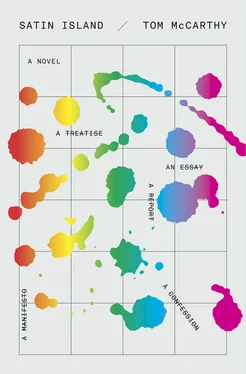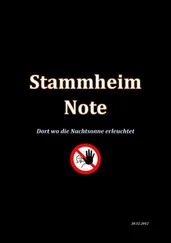13.13These postures that he made you strike up, I asked Madison: were they erotic? Some of them were, she said. Sometimes I had to bend over and stick my arse up in the air, or pull up my culottes and show my thigh, or slip my shirt down off my shoulder. But all this was pretty mild; I mean, he could have made me strip, or raped me, or done anything at all, given the situation. The positions he was making me assume were more like the postures of classical statues, or old paintings. He was getting off on it, though, kind of: I could hear his breathing growing heavier, and hear these quiet grunts, these moans, coming from deep inside his chest. But these were beyond sexual. If they were sexual, the excitement wasn’t exactly for me , but for some kind of relation between me, the angles of my limbs and torso, and the machine, the rhythms of its crackles, beeps and oscillations. When these fell into alignment, when we got it right —well, then he’d moan more deeply, with real pleasure. After a while, I came to recognize these rhythms. What do you mean? I asked. There were these sequences of pitch and frequency, she said, that faded into one another and then came back round again, only a little differently each time. It got so I could recognize these sequences, and know which part of them we were in at a given moment, and what I should be doing at this part, and what was coming next. I came to know just what it was he wanted, how I had to move; he didn’t need to keep telling me what to do. This made him really satisfied. More than just satisfied, she said: it seemed to move him deeply.
13.14Madison looked round the restaurant. The place had emptied out now. The waitresses were sitting at a table, wrapping newly washed cutlery in napkins, which they folded with a regular and automated movement. Two chefs were sitting at another, going through a list of stocks, ingredients, supplies. No one was pushing us to leave; they appeared to have forgotten us, just as we’d forgotten both them and the food they’d made us. So you struck these postures, I said. You ran through sequences of them, and this man watched you. Yes, she answered. He and I kept this up for an eternity. Time seemed to have stopped. We could have been the only people in the world — the first-ever people, a new Eve and Adam. Time seemed, she said again, to have just … stopped: to be suspended, while we two performed this strange ballet being choreographed from elsewhere. You mean you did, I said. No, said Madison: we both did. He was moving too. At first he moved his body and his limbs to show me how I had to move mine; then, as I learnt the sequences, his own movements grew less emphatic, and then almost imperceptible. But they were still going on: his leg would buckle and his knee extend a little; his right shoulder would angle upwards, and his left arm twitch below the elbow. He was as much a part of the choreography as I was. After a while, he closed his eyes; and yet his limbs still subtly moved and twitched and angled, to the same rhythm, the same pattern, to the modulating sound of the machine and my own corresponding sequences of postures. He was, like I said, deeply moved. At one point I saw big tears rolling down his cheeks. You saw …? I started asking, but she went straight on, cutting me off. Then these gave over to sobs, she said. Sobs? I asked. That’s right, Madison answered: he was sobbing. He was a big man, as I mentioned: portly. The sobbing shook his frame. His face had deep, grey wrinkles cut into its cheeks; the tears ran into these, and ran out through them; they were like drainage conduits. Eventually he sat down in the leather chair, slumped deep into it and gave me to understand that the spectacle, charade, the game, was over: I could stand down. And at this moment, the machine’s pitch slackened too: its jags and crackles, that had been so charged and jumping, went all elongated, flattened, like the thing was running down. Apart from the bit that sounded like children’s voices, she said — that part of it remained, and seemed to become clearer …
13.15She paused, and held her head alert, as though she were still hearing, in the restaurant, these children’s voices. So what did you do? I asked her. I stood down, she said. I mean, I stopped making the movements, stopped striking up and running through the postures, and just stood in front of him. After a while, when his sobbing had subsided, he opened his eyes and looked at me. He still had the wand in his hand, hanging by the chair’s side; and he passed this to me now. Passed it to you ? I asked. Yes, Madison replied: he handed me the wand, the cattle-prod. What did you do with it? I asked. I took it from him, she said, and set it down on the floor some feet away. Then I turned back to face him, to see what he wanted; but his face had gone all vacant. So I moved over to the window. When I looked out of this, I saw a garden, running away beneath it. The villa was built on a hill: although we’d gone down one floor from the entrance to get to this room, on the side that I was looking out of now, the far side, the room was two floors above ground level. There was this garden, and there were two children playing in it. They can’t have been much more than five years old. It was their voices I’d been hearing, coming through the window — not through the machine; I’d just assumed that, because the voices had been caught up in the machine’s general noise. Now that this had dwindled to a slow, quiet croak, they carried to me clearly. The children were playing tag or something; sudden shrieks of laughter and excitement leapt from them and ricocheted around the room. I moved a little to the side and lifted the drape, this crinkled curtain. Behind it there was just more wall, as I’d thought. Then I turned back to face the room’s interior. I went up to the chair with segments and appendages, the maybe-dentist’s chair. It had these straps on it, restraining straps I guess; but these were loose, unbuckled and all worn. Then I inspected the machine, she said: the gizmo, this big, clunky apparatus that had held both me and this man in its power for so long. It really was old: it had all these ancient valves and needles set in a worn metallic frame, and knobs with faded numbers round their circumference. The screen was gridded; the speaker’s grille was cross-hatched, set on a diagonal. Nothing was really coming out of the speaker anymore, though — just a kind of sonic dribble. The wave-lines on the screen were still there; but they were placid and immobile. Whatever this thing had been doing, it wasn’t doing it anymore. It had gone all vacant too, just like its operator … Madison seemed to go vacant at this point herself, staring ahead into the restaurant’s dead space. So what did you do? I asked her. I sat down beside him, she said, on the floor, leaning against the armchair’s side. His hand was hanging limp beside my shoulder. I just sat there, and he sat there too, and all the objects in the room just sat there, doing nothing, for a long, long time.
13.16We sat there too, in silence, Madison and I, in this restaurant. I couldn’t think of anything to say. In the fading afternoon light, waitresses and chefs were eating now, taking late lunch or early supper. Eventually I asked her: How did you get out? Out of where? she asked back. The room, I said: how did you leave the room? I didn’t, she said. Not at first. I fell asleep against his chair. I must have been awake for two whole days by this point, if you don’t count the hour of sleep I’d had back at the school building, before the raid. I was really tired. Did he sleep too? I asked. Who? she asked. The man, I said. Maybe, she said. He sat in the armchair for a long time without moving. His breathing was regular and deep, and so was mine; and then I was asleep. When I woke up, he was gone. The machine had been switched off: no more wave-lines, even flat ones; no more noise at all. And the children’s voices had disappeared too. Just moments after I woke up, another man walked in; perhaps his footsteps coming down the corridor, approaching, were what woke me. This new man was much younger — in his thirties, maybe. He was smartly dressed as well, but his clothes weren’t expensive like the older one’s. This man was friendly: he asked me if I’d rested; and I told him yes, I had; and he said: Well, we’d better get you on your way . He spoke to you in English? I asked Madison. Yes, she replied; good English, with a slight Italian accent. I thought he might have been a consular official — a junior one. They use locals for that, don’t they? she asked. I don’t know, I said; is that what he turned out to be? Who? she asked. This other man, I said. I don’t know, she replied; I never found out. I mean, I never asked. He led me from the room, and through some other corridors and doors, not the ones I’d first come through, and then down some other steps; and suddenly I found myself back in the lobby, the reception. You mean up some steps, I corrected her. No, she insisted: down. This man, she went on, handed my receipt, which he must have been given by the plain-clothes guy, to the receptionist, and I got all my stuff back. And he said: There: all accounted for? — something like that. And I told him: Yes, I think so , or something. I didn’t have my mobile, but that had been left behind at the school. He led me back out through the front door, to the cobbled courtyard; and he said, still in a friendly, helpful voice, that I shouldn’t go back to the centre of town, since police were still rounding up people who looked like protestors. Go this way , he said as we got to the road, pointing to the right; then he turned round and went back to the villa.
Читать дальше












